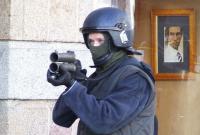-
Scholar goes to prison to study religious radicalization
University of Calgary postdoctoral scholar Ryan Williams never imagined his religious studies degrees would one day lead him to jail. But it turns out prisons provide an important site for learning about the gravest concerns around radicalization and how society can better respond. Williams and two colleagues spent 260 days in two maximum security institutions in the United Kingdom and conducted sixty interviews with staff and 100 with prisoners — some of them convicted for terrorism – better to understand the differences between prison environments that support human growth and those that damage well-being and character. Williams’s studies on prisoners convicted of terrorism open new perspectives on security, marginalization, and society.
-
-
French police thwarted another Paris terror attack: Interior minister

France’s interior minister Bernard Cazeneuve said Islamic terrorists planned to attack another concert in Paris and carry out a mass killing in the city streets. Cazeneuve revealed the information while defending the government’s decision to continue for there more months the state of emergency imposed after the 13 November attacks.
-
-
Europol bolsters EU’s counterterrorism capabilities
Europe is currently facing the most significant terrorist threat in over ten years. The Paris attacks on 13 November 2015 indicate a shift toward a clear international dimension of Islamic State to carry out special forces-style attacks in the international environment. This and the growing number of foreign fighters are posing new challenges for EU Member States. Europol says that more attacks in the EU may happen in the future. Therefore, there is a great need within the European Union to strengthen our response to terror, to suspected terrorist networks and foreign fighters, and have an improved strategic understanding of threats.
-
-
ISIS should be kicked off the open Web: Google official
Jared Cohen, director at Google Ideas and an advisor to the heads of parent company Alphabet Google, said ISIS should be kicked off the open Web. He noted that the Islamist group is always going to be in a position to use some aspects of the Internet, such as anonymized browsing through Tor and the uncatalogued dark Web, but it should be chased away from the open Web.
-
-
Young women’s warning to other women: Don’t be fooled by ISIS
A young woman who converted to Islam after being drawn to ISIS on social media has publicly warned other girls about how the jihadist group uses social media to reach vulnerable individuals such as herself. Her mother called the national hotline and the French police was able to intervene before the two women left for Syria. The young woman has since joined other youngest girls in France’s deradicalization program.
-
-
FBI investigates Kent State professor for ISIS connection
Julio Pino, an associate history professor at Kent State University, is currently under FBI and DHS investigation, which includes interviews with faculty members and students. Informed sources say that Pino has allegedly tried to recruit students to join ISIS.
-
-
UN urges France to protect fundamental freedoms while countering terrorism
The current state of emergency in France and the law on surveillance of electronic communications impose excessive and disproportionate restrictions on fundamental freedoms, a group of United Nations human rights experts warned yesterday. In a list of concerns shared with the French government, the independent experts stressed the lack of clarity and precision of several provisions of the state of emergency and surveillance laws, related to the nature and scope of restrictions to the legitimate exercise of right to freedom of expression, freedom of peaceful assembly and association and the right to privacy.
-
-
Danish town requires public institutions to serve pork

A small Danish town has passed an ordinance making requiring public institutions to serve pork products. The ordinance was passed against an intensifying conflict over food products in Denmark – in what has been dubbed the “meatball war.” Randers City Council in central Denmark announced it wanted to ensure public institutions, including nurseries, provide “Danish food culture as a central part of the offering — including serving pork on an equal footing with other foods.”
-
-
ISIS threatens India’s prime minister with death over beef consumption

ISIS has sent a death threat to India’s prime minister Narenda Modi, over his party’s support for a ban on eating beef. The warning was issued by the Islamist group after Modi announced his support for restrictions on the slaughter and consumption of cows in some Indian states. Hinduism, the dominant religion in India, considers cows sacred and objects to the consumption of beef.
-
-
Iraq: Staggering death toll, sexual enslavement, killing of child soldiers: UN report
A UN report released earlier today details the severe and extensive impact on civilians of the ongoing conflict in Iraq, with at least 18,802 civilians killed and another 36,245 wounded between 1 January 2014 and 31 October 2015. Another 3.2 million people have become internally displaced since January 2014, including more than a million children of school age. ISIS is holding estimated 3,500 slaves in Iraq. ISIS has abducted between 800 and 900 children in Mosul for military training children who refused to fight are killed.
-
-
Cameron supports bans on Muslim face veils

Prime Minister David Cameron said Muslim women can be banned from wearing veils in schools, courts, and other British institutions. Cameron said he will give his backing to public authorities which put in place “proper and sensible” rules to ban women from wearing face veils in comments which will reignite debates. Camron made his views known as his government is set to announce a series of measures aimed at stop British Muslims becoming radicalized.
-
-
New X-ray method could detect nuclear materials

Inspectors need tools to help find nuclear materials hidden behind thick shielding or smuggled inside any of the 100 million-plus cargo containers shipped around the world each year. Uranium is perhaps the easiest nuclear material to obtain and hide. Physicists have demonstrated that their unconventional laser-based X-ray machine could provide a new defense against nuclear terrorism. The scientists used the laser-driven X-ray source to produce an image of a uranium disk no bigger than a stack of three nickels and hidden between 3-inch steel panels.
-
-
Boston Bomber ordered to pay $101 million to victims

Dzhokhar Tsarnaev, 22, the Boston Marathon bomber, has been ordered to pay more than $101 million to his victims. In June, Tsarnaev was sentenced to death for his role in the 2013 bomb attack. The attack killed three people and injured more than 260.
-
-
U.S. air strike on ISIS vault destroys “millions of dollars”
The Pentagon has released footage of an airstrike against an ISIS bank in Mosul, Iraq. The strike destroyed millions of dollars the Islamist organization kept at the bank’ vaults. The attack took place on 11 January. A video footage shows large plumes of smoke emerging above the building after it was destroyed by two 2,000 pound bombs, followed by clouds of currency bills drifting above the explosion.
-
-
Bangladesh Islamist militants sentenced for bombing attacks
Bangladeshi court sentences five members of the Islamist Jamaat-ul-Mujahideen to ten years in jail for masterminded a series of bombings in 2005 as part of a campaign to impose Sharia law in the moderate Muslim nation. The Islamist group had been quiet since six of its leaders were executed in 2007, but lately has resumed its terrorist attacks, targeting pro-democracy bloggers and activists for religious minorities.
-
More headlines
The long view
How Male Grievance Fuels Radicalization and Extremist Violence
Social extremism is evolving in reach and form. While traditional racial supremacy ideologies remain, contemporary movements are now often fueled by something more personal and emotionally resonant: male grievance.
